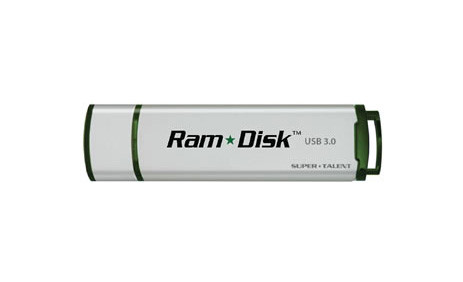SuperTalent Unveils USB 3.0 RamDisk Device
Super Talent has released a USB 3.0-based RamDisk, which uses the system's free memory to achieve very high transfer rates.
Super Talent has released a new, rather interesting device. The device is called the Ram Disk USB. It is a USB 3.0 drive that is said to feature read speeds of up to 4041 MB/s and write speeds of up to 5388 MB/s.
The company didn't disclose exactly how the drive accomplishes this over a USB 3.0 interface, though we imagine that it is simply a USB 3.0 stick with RamDisk software aboard, which loads data to the system's free memory for super-fast performance. All the data would still have to be written back to the drive itself, though, and because USB 3.0 is limited to 5.0 Gb/s (625 MB/s), we imagine that the high transfer rates are only short term and not sustainable for large quantities of data.
"We are excited to release the RamDisk USB. This product can improve the productivity of those who work with large files and programs by harnessing the power of their system's RAM to deliver transfer speeds of over 4,000 MB/s. The Ram Disk is as portable as a regular USB, giving the user the freedom to take their work anywhere. The Ram Disk provides the power of increased productivity through its incredible speed abilities, which can be many times faster than a SSD. This drive is especially suited for creative professionals. The Ram Disk is an ideal drive for anyone seeking a speedy drive with great performance," said Abraham Ma, CEO of Super Talent Technology.
Get Tom's Hardware's best news and in-depth reviews, straight to your inbox.
Niels Broekhuijsen is a Contributing Writer for Tom's Hardware US. He reviews cases, water cooling and pc builds.
-
superman21 Maybe my math is a little off today, but I'm pretty sure 5.0 GB/s is not the same as 625 MB/s......Reply -
vittau So instead of having the OS transfer the files as usual, let's use a middleware to fake a super fast transfer and then transfer it slowly anyway. Genius!Reply -
gnarr You are right, 5 GB/s are not the same as 625 MB/s, but 5 Gb/s are the same as 625 MB/s .Reply -
gnarr You are right, 5 GB/s are not the same as 625 MB/s, but 5 Gb/s are the same as 625 MB/s .Reply -
warezme If you have enough RAM on your system, it would be faster to create a RAM disk off system memory and just place your system cache on it, no USB3 bus limitation. This idea has been around for decades.Reply -
chumly 32, 64, 128, 256, 512Reply
5120/8 = 640
I don't understand why humanity is still in Base 10. We should switch to 8. :) Maybe when Skynet gets here.... -
nukemaster Reply
8 megabits = 1 megabyte11012953 said:Maybe my math is a little off today, but I'm pretty sure 5.0 GB/s is not the same as 625 MB/s......
so
5000(assuming they use the base 10 giga like they seem to now) megabits = 625 megabytes.
If they are still using 1024(they way that things have always been in the past) it would be 640 megabytes.
Everyone seems to do it differently, just like how ALL HDD makers use base 10 1000megabytes = 1gigabyte vs 1024(what I call the real way). -
azgard Not really sure how this is effective or where they even get those numbers, as 625 MB/s is wrong too, sustained transfer rates would top out at 512 MB/s with no other devices on the bus. This is also ignoring the fact that USB is a horrible way to implement whatever this is with all of the cpu overhead required to run the USB device in the first place. This thing claims to be a ramdisk using system ram....from a usb port really confusing.Reply -
superman21 Reply11013402 said:
8 megabits = 1 megabyte11012953 said:Maybe my math is a little off today, but I'm pretty sure 5.0 GB/s is not the same as 625 MB/s......
so
5000(assuming they use the base 10 giga like they seem to now) megabits = 625 megabytes.
If they are still using 1024(they way that things have always been in the past) it would be 640 megabytes.
Everyone seems to do it differently, just like how ALL HDD makers use base 10 1000megabytes = 1gigabyte vs 1024(what I call the real way).
I know how it works. The original line read GB/s and MB/s, which is incorrect. Capitalization matters with this sort of stuff.

